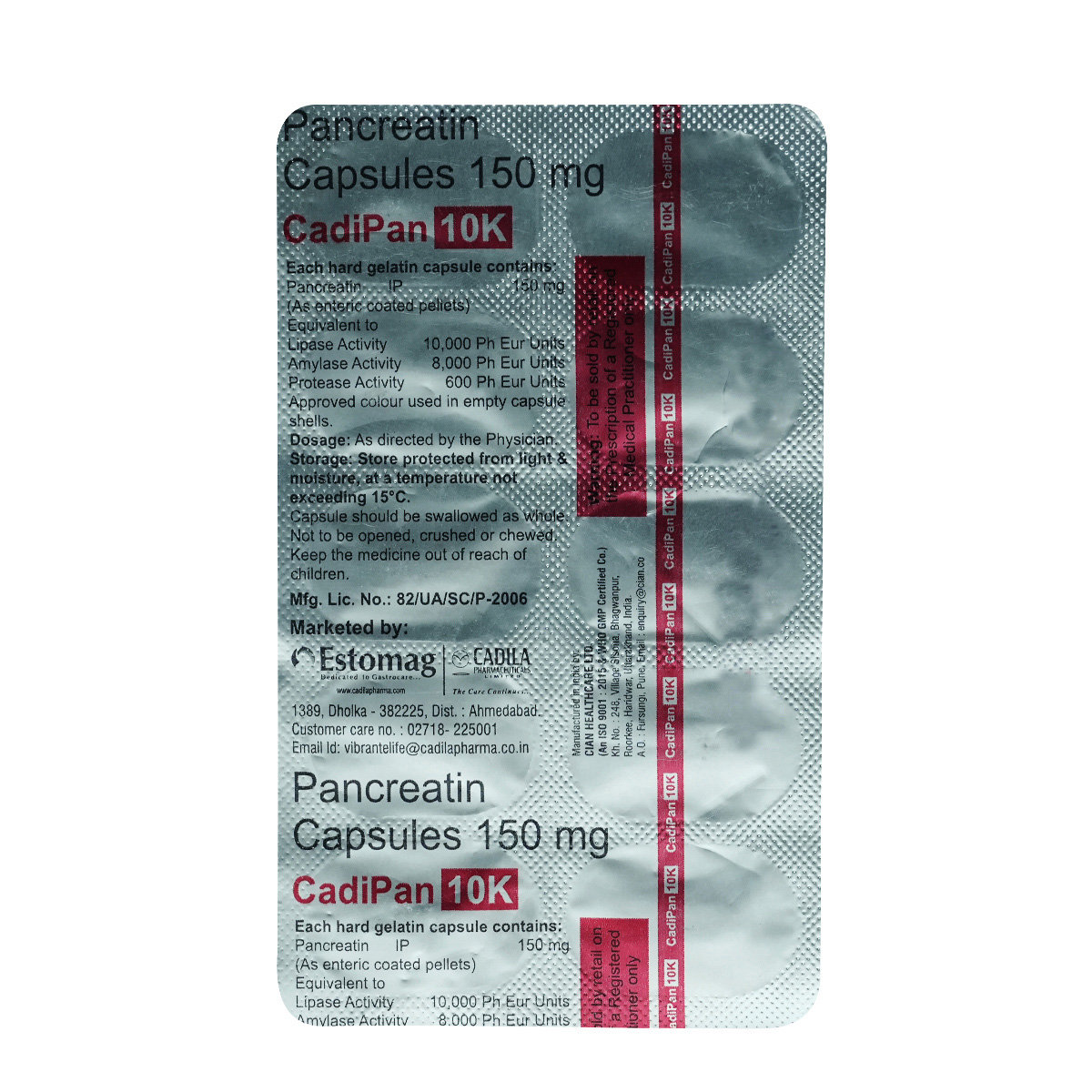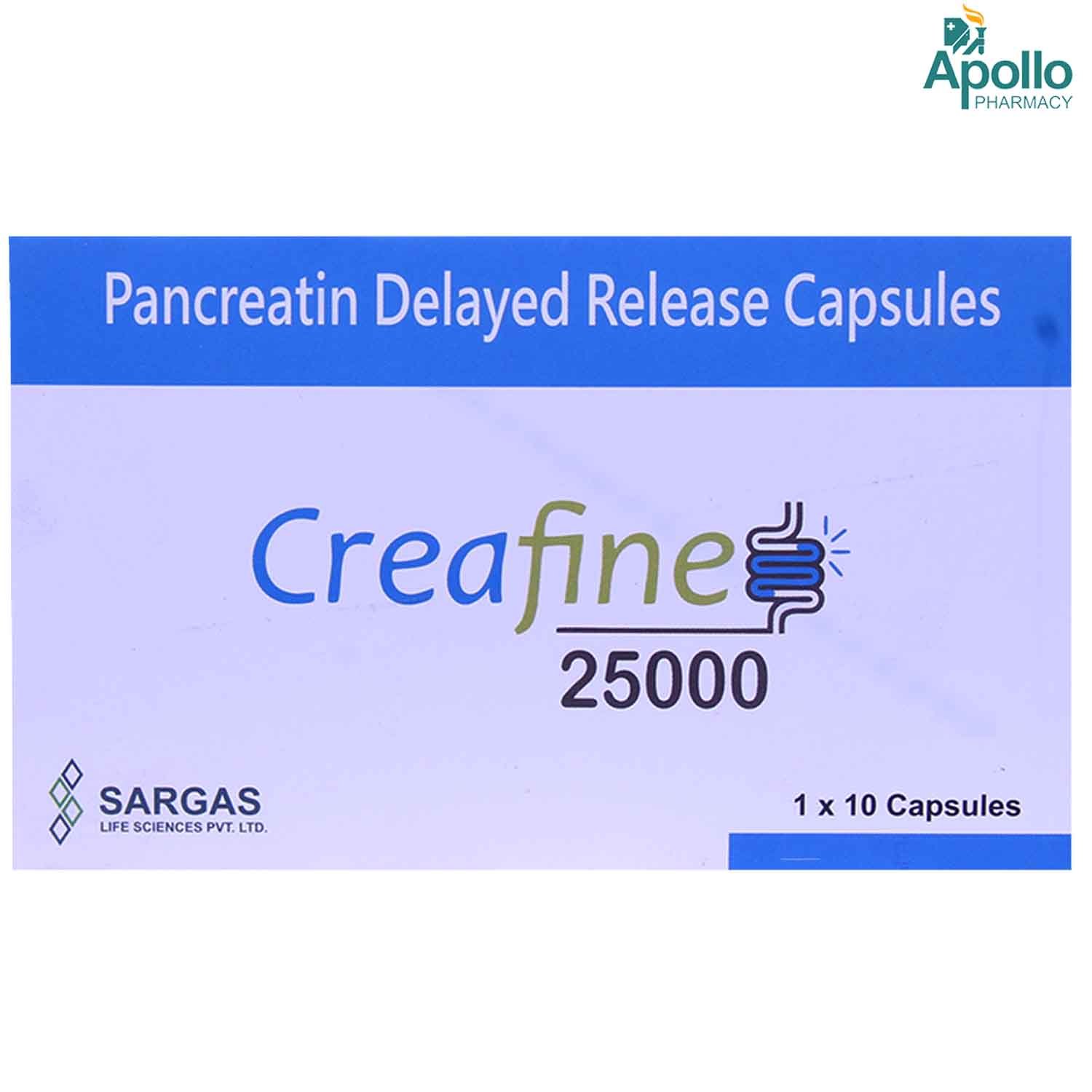Pancreatin
About Pancreatin
Pancreatin is a pancreatic enzyme supplement indicated for the treatment of pancreatin enzyme deficiency due to cystic fibrosis (an inherited disorder that damages the lungs and digestive system), chronic pancreatitis (inflammation of the pancreas), or other conditions.
Pancreatin contains Pancreatin, which is a combination of digestive enzymes such as porcine-derived lipases, proteases, and amylases. These enzymes help in the digestion of food. Pancreatin mixes thoroughly with the food and helps in digestion as it passes through the gut.
In some cases, Pancreatin may cause side effects such as nausea, mild stomach pain, diarrhoea, and mild skin rash. Most of these side effects do not require medical attention and will resolve gradually over time. However, consult your doctor if any of these side effects persist.
Inform your doctor if you have gout, asthma, or any other medical condition. Consult your doctor if you are pregnant or breastfeeding. Pancreatin may cause dizziness, so drive with caution. Let your doctor know if you are taking any other medicines or have pre-existing medical conditions.
Uses of Pancreatin
• Treatment of Exocrine Pancreatic Insufficiency: Pancreatin compensates for the deficiency of digestive enzymes and supports digestion in conditions such as chronic pancreatitis (inflammation of the pancreas), cystic fibrosis (a genetic disorder that affects the lungs), and pancreatic cancer.
• Treatment of Steatorrhea (Fatty Stools): Pancreatin helps break down fats, reducing fat content in stools and preventing malnutrition.
• Support after Gastrointestinal Surgery: Pancreatin may be used to assist digestion when the flow or production of digestive enzymes is impaired after procedures like pancreatectomy (surgical removal of the pancreas) and gastric bypass (a weight-loss surgery that reduces stomach size).
Medicinal Benefits
- Pancreatin is a pancreatic enzyme supplement used to manage exocrine pancreatic insufficiency, a condition where the pancreas fails to produce enough digestive enzymes.
- It replaces missing digestive enzymes to help break down and absorb nutrients from food effectively.
- Treats enzyme deficiency caused by conditions like cystic fibrosis, chronic pancreatitis, pancreatic cancer, or surgical removal of the pancreas.
- Helps relieve symptoms such as bloating, gas, abdominal discomfort, and diarrhoea caused by poor digestion.
- Aids in fat digestion and reduces fatty, foul-smelling stools (steatorrhea), a common symptom of exocrine pancreatic insufficiency.
- Improves the absorption of essential nutrients, thereby preventing malnutrition and supporting overall health.
- Helps patients with exocrine pancreatic insufficiency maintain or gain a healthy weight by ensuring proper digestion and nutrient uptake.
- Reduces digestive discomfort and enhances appetite and nutrition in individuals with chronic digestive enzyme deficiencies.
Directions for Use
- Pancreatin should be taken immediately after a meal or snack.
- Follow your doctor's instructions on the dosage and timing of this medication.
- Swallow Pancreatin as a whole with a glass of water.
- You may also open the capsules and mix the granules (do not crush them) with soft foods like yoghurt or applesauce, or with an acidic liquid such as apple, pineapple, or orange juice. Consume the mixture immediately.
- Do not crush or chew this medication.
Storage
Side Effects of Pancreatin
- Nausea
- Mild stomach pain
- Diarrhoea
- Mild skin rash
Drug Warnings
- Do not take Pancreatin if you are allergic to pork (pig), cow, or buffalo products.
- Consult your doctor if you experience stomach pain, swelling, constipation, and vomiting, as patients taking Pancreatin with cystic fibrosis may develop a rare bowel condition called fibrosing colonopathy.
- Inform your doctor before taking Pancreatin if you have gout, asthma, or any other medical condition.
- Consult your doctor before taking Pancreatin if you are pregnant or breastfeeding.
- Pancreatin may cause dizziness, so drive with caution.
- Pancreatin can be given to children if prescribed by the doctor; the dose depends upon the child’s age and body weight.
- Let your doctor know if you are taking any other medicines, including supplements or herbal products.
Drug Interactions
Drug-Drug Interactions: Pancreatin may interact with calcium, iron, and calcium supplements.
Drug-Food Interactions: Avoid taking Pancreatin with non-acidic foods or liquids, as this may change the way Pancreatin works in your body.
Drug-Disease Interactions: No interaction found/established.
Drug-Drug Interactions Checker List:
Safety Advice

Alcohol
cautionIt is unknown whether alcohol interacts with Pancreatin. Please consult your doctor if you have any concerns regarding this.

Pregnancy
cautionPancreatin belongs to pregnancy category C. Consult your doctor before taking Pancreatin if you are pregnant; your doctor will prescribe only if the benefits outweigh the risks.

Breast Feeding
cautionIt is unknown whether Pancreatin passes into breast milk. Consult your doctor before taking Pancreatin; your doctor will decide whether breastfeeding mothers can take Pancreatin or not.

Driving
cautionPancreatin does not affect your ability to drive. However, Pancreatin may cause dizziness. So, do not drive or operate machinery unless you are alert.

Liver
cautionDose adjustment may be needed. Consult your doctor before taking Pancreatin if you have a liver impairment or any concerns regarding this.

Kidney
cautionDose adjustment may be needed. Consult your doctor before taking Pancreatin if you have kidney impairment or any concerns regarding this.

Children
safe if prescribedPancreatin can be given to children if prescribed by the doctor. The dose depends upon the child’s age and body weight.
Habit Forming
Diet & Lifestyle Advise
- Eat small portions of meals 3-5 times a day, as larger meals make the digestive system work overtime.
- Include a diet rich in fruits and vegetables.
- Avoid processed, deep-fried foods as they are hard to digest.
- Maintain a balanced diet that includes proteins, carbohydrates, and fats.
- Stay hydrated by drinking enough water, as it helps the digestive system function smoothly.
- Avoid highly processed foods that contain trans-fat, hydrogenated fats, and saturated fats. Instead, include foods containing monounsaturated, polyunsaturated, and omega-3 fatty acids. Include olive oil, peanut oil, seeds, nuts, salmon, and tuna fish as they contain healthy fats.
- Avoid foods rich in fibre such as brown rice, barley, lentils, and peas as they might interfere with the enzyme activity.
- Avoid or limit alcohol consumption as it can cause increased damage to the pancreas.
Special Advise
- Try to avoid taking an antacid within 1 hour before or after you take Pancreatin. Simultaneous use of antacids containing calcium carbonate and/or magnesium hydroxide may lead to pancreatin deficiency.
Patients Concern
Disease/Condition Glossary
Exocrine pancreatic insufficiency: The Pancreas plays an essential role in the digestion of food. It produces enzymes that help in the breakdown of food and the absorption of nutrients. Exocrine pancreatic insufficiency occurs in individuals whose bodies do not produce sufficient amounts of their own enzymes. This leads to the inability to properly digest food due to the pancreas's lack of a digestive enzyme. Exocrine pancreatic insufficiency could occur due to various conditions such as cystic fibrosis (an inherited disorder that damages the lungs and digestive system), pancreatitis (inflammation of the pancreas), diabetes, celiac disease (inability to digest gluten), pancreatic cancer, inflammatory bowel disease, Zollinger-Ellison disease, and pancreatic or stomach surgery. Exocrine pancreatic insufficiency symptoms include abdominal pain, bloating, diarrhoea, flatulence, weight loss, and steatorrhea (loose, fatty, smelly stools).
FAQs
Pancreatin is used to treat Pancreatic insufficiency (pancreatin enzyme deficiency).
Pancreatin contains pancreatin enzymes that break down food and convert it into energy. Pancreatin is a combination of amylase (to digest starch), protease (to digest protein), and lipase (to digest fat). Together, it fulfils the digestive enzymes' requirements in conditions such as pancreatitis (inflammation of the pancreas), cystic fibrosis (a genetic disorder that damages the lungs), pancreatic cancer, pancreatectomy (surgical removal of the pancreas), and steatorrhea (loose fatty stool due to poor fat absorption).
Pancreatin might interfere with the absorption and reduce the effectiveness of folic acid and iron. To prevent this, maintain a minimum gap between both.
Diarrhoea might be a side-effect of Pancreatin. Drink enough fluids and eat non-spicy food if you experience diarrhoea. Consult your doctor if you experience watery diarrhoea or if you find blood in your stools. Do not take anti-diarrhoeal medicine on your own.
Mixing Pancreatin with non-acidic food or liquids, chewing or crushing may cause irritation in the mouth. It might also change the way Pancreatin works in the body. Do not hold Pancreatin or its contents in your mouth.
To treat your condition effectively, continue taking Pancreatin for as long as your doctor has prescribed it. Many patients will need to take Pancreatin for the rest of their lives. Do not hesitate to consult your doctor if you experience any difficulties while taking Pancreatin.
Pancreatin is a pancreatic enzyme derived from the pancreatic organs of pigs used for food. Consult your doctor before taking Pancreatin if you are allergic to the pig (pork), cow products or buffalo products.
Pancreatin may cause side effects such as nausea, mild stomach pain, diarrhoea, and mild skin rash. Most of these side effects do not require medical attention and will resolve gradually over time. However, you are advised to talk to your doctor if you experience these side effects persistently.
Pancreatin is safe to be used in children if prescribed by the doctor. The dose is determined by the child’s age and body weight.
Take Pancreatin during or immediately after eating a meal or a snack, and drink plenty of water.
Pancreatin is safe to be taken if prescribed by the doctor. Do not take Pancreatin if you are allergic to any of its ingredients, pig or pork products.
Include fruits, vegetables, whole grains, lean meats, poultry without skin, fish, yoghurt, cheese, and non-fat/low-fat milk. Avoid high-fat, deep-fried, and buttered foods.








